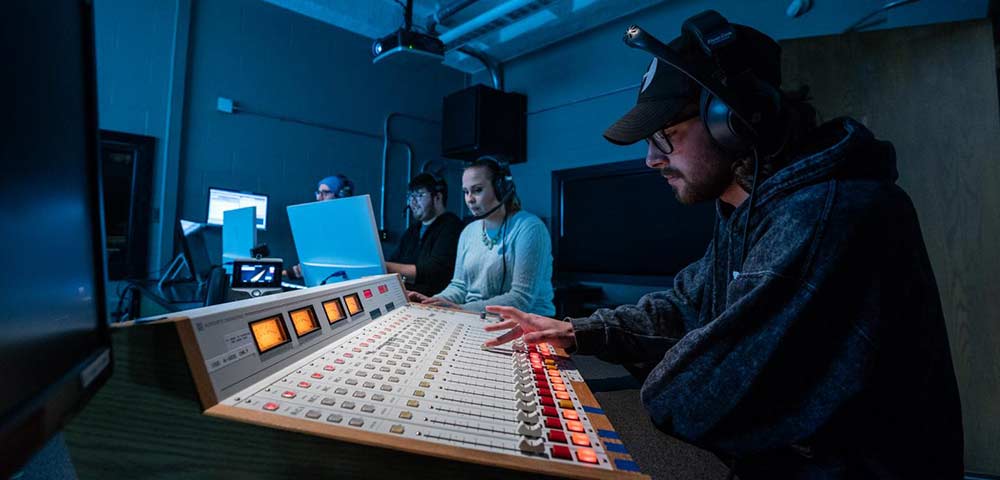Master’s Degrees in Cyprus: Top Universities, Programs, and Application Tips
Discover the benefits of pursuing a Master's degree in Cyprus with top-ranking universities, afforda...
2024-10-02
Do you know that broadcasting through radio is the oldest form of electronic communication? Do you know that the number of households who own a T.V is expected to become 1.8 billion by 2026? Pieces of information like these forces us to ask an important question: how can someone be a part of that huge industry? Is there something one can learn to know more about radio and television ? The answer is simple: Radio and Television Major.
It is worth mentioning that this major is known by more than one name, it is usually referred to as Radio Television and Film major or Radio and Television broadcasting major. This major provides students with an extensive study of storytelling, communication and production. The study of Radio Television and Film majors is offered in more than one study level by multiple universities.
Radio and Television offers graduates various career opportunities in creative fields and is a great opportunity for students who love to innovate.
In this guide you will find all the information you need about Radio and Television Major and as usual all the guidance you might seek from our professional team at Edmov.
The radio broadcasting industry includes stations and networks that transmit audio content over AM, FM, and satellite channels.
Television broadcasting on the other hand, operates in the same way but involves studios and networks that broadcast audiovisual content over-the-air, excluding cable and satellite television. This industry is controlled by multiple large multimedia corporations.
Choosing the right major needs extensive research .To determine if a Radio and Television Major is the one for you, you have to determine what your future plans include. You also must consider your preferences and characteristics. As we have mentioned, this major is recommended for people who would like to work in a creative industry that always pushes them to innovate.
It is also worth mentioning that there are other majors that are considered related to radio tv and film majors such as communications, film studies and journalism. You might want to consider any of these majors in case radio tv and film major is not the perfect fit.
Associate Degree in Broadcasting:
In this program you will gain foundational knowledge in broadcasting, production, and media technology. Students have the opportunity to learn by experience with equipment and learn the basics of audio and video production, essential for entry-level positions in the industry.
Bachelor’s Degree in Communication or Media Studies:
A bachelor’s degree offers an extensive understanding of media theory, production techniques, and industry practices. Students get to learn all about various aspects of radio and television, including scriptwriting, directing, editing, and media ethics, which prepares them for a wide array of careers in the media industry.
Master’s Degree in Media Production:
A master’s degree is a way of expanding studnet’s knowledge in a certain field. A Master's degree in Media Production focuses on developing specialized production skills, media management, and research methodologies. Students engage in an in-depth study of media production processes and technologies. They are often asked to work on a significant project or submit a thesis that showcases their expertise and prepares them for leadership roles in the field.
Broadcasting:
This area combines both radio and television broadcasting, and includes the delivery of news, sports, and entertainment programs. If you work in this field you will be responsible for transmitting content to audiences through different platforms.
Production:
Production involves creating content, encompassing tasks such as scriptwriting, editing, directing, and producing shows. This area focuses on the creative and organizational aspects of bringing a program to life, ensuring that it meets the intended vision and standards.
Technical Operations:
As the name suggests, technical operations cover the technical aspects of broadcasting, like sound engineering, video editing, and equipment maintenance. Professionals in this field ensure that the technical quality of broadcasts is high and that all equipment functions correctly.
On-Air Talent:
This area is the most popular one, it includes radio DJs, TV anchors, and show hosts who present content shown to the audience. On-air talent is responsible for engaging listeners and viewers, delivering information, and providing entertainment in a compelling and professional manner.
When you study a field that encourages creativity then career opportunities are going to be as amazing and as diverse as the curriculums and the areas you learn. Here is a brief list of the careers you can have when you finish your Radio and Television degree:
Technical Careers:
Technical careers are perfect for those who would like to work behind-the-scenes in operations that ensure high-quality broadcasts. Jobs in this area include but are not limited to sound engineers, video editors, broadcast technicians, and equipment operators who manage and maintain the technical infrastructure needed for successful broadcasting.
On-Air Talent Careers:
On the other hand, careers in these fields are for people who are not camera shy. On-air talent careers involve presenting and engaging with the audience directly. This includes roles such as radio DJs, TV anchors, news reporters, and talk show hosts who deliver news, entertainment, and other content to listeners and viewers.
Production Careers:
Those pursuing production careers focus on the creative and logistical aspects of content creation. This includes roles like producers, directors, scriptwriters, and editors who collaborate to develop, organize, and finalize shows and segments to be presented to the public.
Although there are multiple agencies in the market, yet Edmov prides itself for being the first AI powered platform that uses the latest technologies to help students who would like to study in Turkey.
Edmov aims to foster a culture of studying abroad while offering users engaging and impactful learning experiences. Our team is always willing to provide guidance and assistance to students and help them feel less overwhelmed by the application process. Contact our team and make informed decisions now.